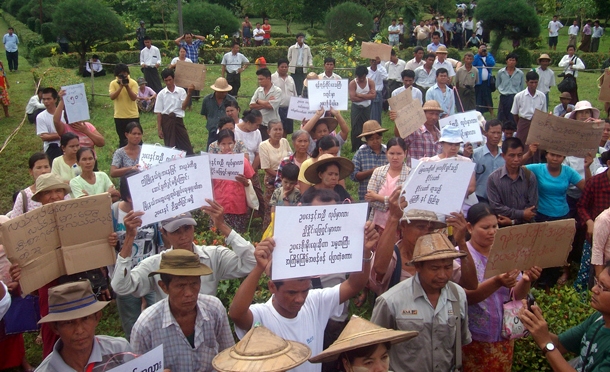RANGOON—An activist has been summoned to appear in a Rangoon Division court to answer defamation charges filed by a Burmese company he accused of illegal land grabs.
Nay Myo Wai, president of the Peace and Diversity Party, told The Irrawaddy that he received an official notice to appear at Mingaladon Township court on Aug. 23 to respond to allegations made by Zay Kabar Company under Section 500 of the Penal Code.
Thein Than Oo, of the Lawyers Network who will represent the activist, said he has received no formal explanation regarding the exact nature of the complaint and will hear the full details for the first time in court on Thursday.
“According to the summons, my client is facing a defamation lawsuit. To the best of my knowledge, it might be regarding a farmland dispute in Shwe Natha Village in Rangoon where Zay Kabar Company was accused by Nay Myo Wai of illegal land seizures,” said the lawyer.
The 40-years-old activist has been lobbying for land rights in Burma since 2010, helping peasants in many different parts of the country. He also represents 35 farmers in Shwe Natha who had 815 acres of farmland—a lifeline for more than 700 people—allegedly seized by the firm in 2010 to develop an industrial zone.
Zay Kabar Company is owned by Khin Shwe, an MP from the ruling military-backed Union Solidarity and Development Party.
The company initiated legal proceedings against Nay Myo Wai late last month based upon his claim that the seized land was not yet demarcated as an industrial zone under Section 39 of the 1953 Land Nationalization Act.
According to the law, any farmland that has not been registered cannot be converted for an alternative use. The land must also have been left vacant for a long time.
“I didn’t mean to defame the company. I just told the truth that the land they’ve confiscated still has not had any legal approval to be developed as an industrial zone. I have solid evidence,” said Nay Myo Wai.
Khin Shwe said during a parliamentary debate on July 23 that his company did not force people from their land but confiscated it legally, adding that he had already received the green light for his project from the relevant government bodies.
When Zay Kabar seized 37 acres of farmland in Shwe Natha Village in 2010, Kyaw Sein received 300,000 kyat (US $375) per acre in compensation.
“Even at the time, an acre of farmland in our neighborhood cost up to 3,000,000 kyat ($3,750). In a take-it-or-leave-it offer, Khin Shwe told us that if the government took our land instead, we would only receive very low compensation. We had no choice. We were exploited,” said the 63-year-old farmer.
“I just pointed out that what [Zay Kabar] did is illegal,” Nay Myo Wai explained. “I have already told them that if they want the land, negotiate with the farmers first. Give them proper compensation for their land. That’s all. I don’t broker price negotiations for them. It’s a do-it-yourself approach.”
Burma is an agricultural country where more than 70 percent of its 60 million people work on farmland. But land grabs have been rife throughout the country under the former military dictatorship.
Countless reports tell of farmers and their families who had lived and worked on land for generations being forcibly ejected with little or no compensation for a variety of projects—including gas pipelines, industrial zones and army bases.
With the emergence of President Thein Sein’s reformist government, land grab victims, who are generally uneducated, have started speaking out about their plight with the help of activists like Nay Myo Wai.
Zaw Gyi was 17 when more than a dozen acres of his family’s farmland on the outskirts of Rangoon was confiscated by Zay Kabar Company with meager compensation in 1997.
“With the loss of our land, our ten family members became homeless overnight,” recounted the buffalo farmer who lives hand-to-mouth.
He said he will join other peasants on Thursday to march to Mingaladon Township to support Nay Myo Wai on his court appearance. “We have to do this because he’s working for us,” said the 32-year-old. “We will support anyone who stands for us. If you do, we’ll be with you too.”
Nay Myo Wai considers the lawsuit a struggle between two classes—the corrupt fat cats in power versus the farmer underdogs.
“The peasants are only asking for what they deserve and the other party retaliates with a lawsuit,” he said. “If the company goes into partnership with farmers, it won’t happen. A wealthy person by no means has the right to kick out poor farmers simply as he wants their land for his own interests.”
The activist said that he has no plans to countersue as late last month Parliament approved the formation of an investigative commission on land confiscations.
“Then came Zay Kabar’s defamation lawsuit against me,” he said. “Let’s see how many people are going to put bail up for me on Thursday.”

















